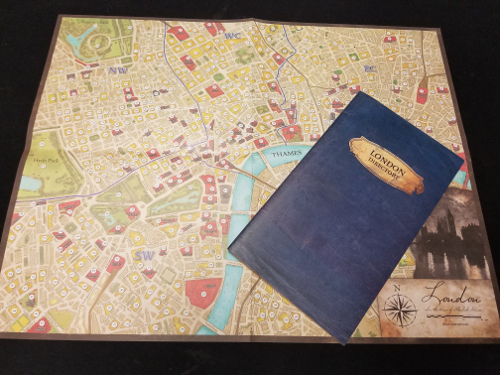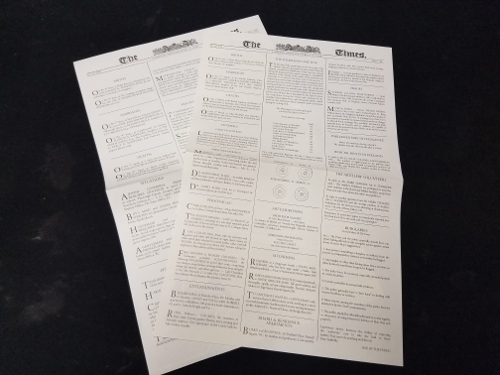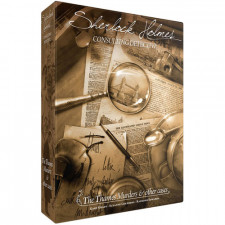Sherlock Holmes Consulting Detective Review
on Aug 16, 2017
Someone has been murdered and the police are unable to crack the case. They turn to the world’s most famous consulting detective to help them ferret out the truth. In Sherlock Holmes Consulting Detective, you attempt to solve the murder and assist the renowned investigator. If you enjoy mysteries or detective stories, then you absolutely must try your hand at solving the cases inside this game.
Consulting Detective comes with ten individual cases. Each begins with a narrative. Either the police or some interested party comes to Holmes to tell him of an unusual murder. The players form the Baker Street Irregulars – a sort of unofficial band of Holmes enthusiasts who use his trademark tools of observation and deduction to ferret out the truth. This game is fully cooperative with all players working together and discussing possible leads.
After reading the introduction, the players are left to their own devices about how to proceed in an almost entirely open world setting. They can visit any number of locations throughout London. Typically, players will want to start at the crime scene or interviewing notable leads and then go from there. As you do, you learn more about the murder and, hopefully, enough to solve it.
What’s interesting is that Consulting Detective provides very little in the way of handholding. If a person is named, it doesn’t tell you to interview them. Nor does it have an easy list of pertinent places to visit in the casebook. Instead, the game comes with a directory – basically a phone book – and if you want to interview someone you have to first look them up there. Then, once you know the address, you can go to that location in the casebook and see what you discover.

Another intriguing source of clues is the newspaper. Each case comes with the day’s paper which typically provides some helpful insights – at least if read with a discerning eye. It also includes plenty of unrelated information, requiring players to carefully comb the articles for pertinent clues.
But the game doesn’t leave you totally at sea. You have a set of fifteen contacts that are present in every case. People like the medical examiner who can give more information about the body or London’s cab drivers who may be able to tell you where a suspect was picked up or dropped off. Generally, you don’t need to go to your contacts to solve the murder, but they can point you back to the right track if you feel lost.
Once you think you’ve figured it out, you flip to the back of the casebook where there are a series of questions. Answer them as best you can, then take a look at the answers. You generally get points for correct answers and reduce that score for each location visited. You can theoretically beat Holmes’ score of 100, but just be glad if your score is positive.
Consulting Detective is a blast to play. Players quickly find themselves immersed in a murder mystery in a setting that is familiar and evocative. With the right group, you can almost hear Big Ben in the background and you find yourself immersed in the mystery with the answers often tantalizingly beyond your fingertips. Sometimes, a single person might get stuck, but with the input of friends and colleagues, new revelations can develop. Why was the soldier turned? Why did the victim have a note in his handwriting, but signed with someone else’s initials? Questions like these are best solved while bouncing ideas around the table.
And that’s really the best part of the game. You get the feeling of sitting in the parlor, discussing clues and creating hypotheses for the group to analyze. In fact, the setting is so evocative that the experience lends itself well to role-playing.

While most cooperative games do a good job of rallying everyone to a common goal, Consulting Detective provides an altogether different type of experience. Each person contributes toward the problem and approaches it in a unique way. The result is something more collaborative and imaginative than found in most cooperative titles.
But be warned. Because Consulting Detective doesn’t spoon-feed you the answers, it can be difficult and you should expect some amount of frustration. Sure, all of the clues are there, and you have everything you need. But getting from the narrative to the answers can be a tricky business. Especially since the game isn’t shy about planting false leads.
The sole downside to the game is that it comes with a finite number of cases. And while it’s enough to keep you entertained for a good while, you’ll ultimately make your way through all of them. Like an escape room, there is just one solution and you can’t unlearn it. Although the ride is fantastic, just be prepared for the disappointment of finishing it out – like binge watching the final season on Netflix.
Still, for those ten cases, Consulting Detective is an amazing experience for amateur sleuths. It provides a cooperative experience that is relatively free of heavy rules or mechanical requirements. It lets pretty much any number of players jump in and contribute their theories. And it provides a cerebral thrill that is relatively unique among tabletop games.

 Customer Support
Customer Support  Subscribe
Subscribe 




 Account
Account  Wishlist
Wishlist 

